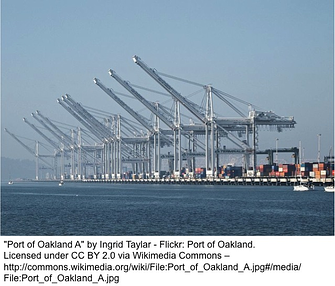You know what there hasn’t been enough of lately? ILWU drama at West Coast ports. Don’t worry, the ILWU Local 34 at the Port of Oakland is solving that problem.
 So much so, in fact, that the Port of Oakland was closed down on Sunday night.
So much so, in fact, that the Port of Oakland was closed down on Sunday night.
Shippers were disgusted with the costly slowdowns and congestion at West Coast ports during the long and contentious contract negotiations between the International Longshore & Warehouse Union (ILWU) and the Pacific Maritime Association (PMA). When the new contract was ratified by the ILWU on May 22nd, the hope was for port stability on the West Coast, at least for a few years before negotiations start on the 2019 contract.
However, whenever a new contract goes into effect at the ports, there are kinks to be worked out in its implementation.
There seem to be a lot of kinks at the Port of Oakland as Sunday’s shutdown is “the third work stoppage caused by the ILWU in Oakland in just over a week,” according to a PMA statement.
The PMA statement released yesterday (June 1st) announced:
Despite reaching a new agreement in the protracted 2014 negotiations with PMA on a dispatch procedure for Sunday and holiday operations at the Port of Oakland, ILWU Local 34 officials decided not to honor the agreement. Instead, the Union officials refused to dispatch workers for the second shift on Sunday, causing a shutdown of terminal operations at the Port of Oakland.
Sunday’s night shift was the first shift during which the new contract’s dispatch procedure would go into effect. Obviously, it wasn’t an overly effective start.
PMA’s statement doesn’t detail the new procedure saying only, “In short, the dispatch process outlines times by which labor orders must be placed.” A Bill Mongelluzzo article in the Journal of Commerce (JOC) enlightens us on the new dispatch procedure:
In the past, terminal operators had to inform ILWU Local 34 by Saturday morning as to its need for marine clerks for the Sunday night shift. Employers said they often had difficulty ascertaining their needs until the day of the dispatch, so the new contract stipulates that the terminals must file their dispatch needs on Sunday mornings for the Sunday night shifts.
When the ILWU Local 34 did not dispatch workers for the second shift on Sunday that the employers at the Port of Oakland put in for on Sunday morning, the PMA took the matter to an arbitrator. The PMA described the results in their statement:
After the ILWU failed to adhere to the new dispatch procedures for vessel operations for the second shift on Sunday, the PMA took the matter to an area arbitrator who ruled that ILWU officials and dispatchers took a unilateral action in violation of the agreement with PMA. The arbitrator further instructed the ILWU to accept and dispatch employers’ labor orders. The arbitrator also ruled that the ILWU reneged on an agreement to work around the dispute.
After all the drama at the end of the contract negotiations that centered around the ILWU being able to get rid of arbitrators who rule against them, I would expect the ILWU to be gunning for this arbitrator.
The JOC article shared the ILWU’s perspective on Sunday’s event:
ILWU spokesman Craig Merrilees gave a different account of what happened. Local 34 officials charged that the PMA itself did not follow all of the provisions in the new contract concerning the dispatching of marine clerks, but rather “cherry picked” the provisions it wanted to enforce. Nevertheless, the ILWU worked with the PMA to ensure that dispatching for Monday’s day shift worked smoothly, Merrilees said.
The PMA statement did indeed say, “labor orders were properly processed for the first shift on Monday, and operations at the Port of Oakland are currently normal.”
While this new dispatch procedure seems to now be worked out, Sunday’s incident does leave tension between the PMA and ILWU in Oakland as can clearly be seen in the words of the PMA:
“The ILWU in Oakland has a long history of taking unilateral actions that disrupt ongoing cargo operations,” said PMA spokesperson Wade Gates. “We have a new coastwise contract in place that was recently ratified by both parties, a new understanding in Oakland on dispatch and an arbitrator’s ruling finding the ILWU in violation of that new understanding. It’s time for the ILWU leaders in Oakland to recognize these facts, follow the provisions of the new agreement and join us in regaining the shipping community’s confidence in West Coast ports.”
There is still a lot of work to do in regaining the shipping community’s confidence in West Coast ports.
